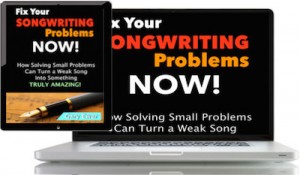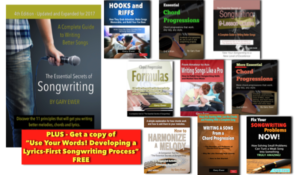I recently read an interesting article written by Susan Reynolds, “Five Reasons You’re Experiencing Writer’s Block,” available at the Psychology Today website. In it, Reynolds make the case that writer’s block is a condition that we’ve created for ease of identification, and that it doesn’t actually exist. She starts this way:
We’re going to go there, right now, even though it might lead to automatic resistance: Writer’s block is a myth.
Her assertion isn’t as radical as it sounds, and in fact, I hope you take the time to read her article because she offers a very clear analysis of what’s going on when you feel “blocked.” Though her essay pertains specifically to writers of fiction and non-fiction, her observations apply every bit as much to the writing of music.
 Many problems can make finishing a song difficult, but this ebook, “Fix Your Songwriting Problems – NOW!” outlines 7 of the most common ones, and offers solutions you can try. Get it separately, or as part of “The Essential Secrets of Songwriting 10-eBook Bundle”
Many problems can make finishing a song difficult, but this ebook, “Fix Your Songwriting Problems – NOW!” outlines 7 of the most common ones, and offers solutions you can try. Get it separately, or as part of “The Essential Secrets of Songwriting 10-eBook Bundle”
To summarize her position on writer’s block, Reynolds contends that difficulties in writing is part of what being a writer is all about. It’s a natural condition. Partly through the “creation” of the term writer’s block (“the concept originated in the early 19th Century when the English poet Samuel Taylor Coleridge first described his “indefinite indescribable terror” at not being able to produce work he thought worthy of his talent”), we’ve come to expect that the free-flowing of ideas is the normal condition, and difficulties getting the flow happening is a situation to be fixed.
Reynolds then outlines what she sees as the five most common reasons for difficulties being creative:
- You’ve Lost Your Way
- Your Passion Has Waned
- Your Expectations Are Too High
- You Are Burned Out
- You’re Too Distracted
Again, I encourage you to read her article because I think she makes some very strong points, and her thoughts on each of those headings are very useful for anyone in the creative arts, including, I believe, songwriters.
I have only one quibble: she’s saying that the fact that there are real reasons for creative difficulties (“You are burned out”, for example) means that you don’t really have writer’s block, you are simply exhausted. “Lie back, have a margarita, and chill,” she says. “Once you’re rested, you’ll likely find the desire to write has come roaring back.”
I’m struggling to believe that a case of burnout can be solved by a margarita. To me, burnout is a deeper condition that usually requires implementing some fundamental changes in one’s creative process.
I do like her point that by labeling creative difficulties as writer’s block, we’ve created a condition that needs solutions, when in fact the normal state of things in creative writing (whether words or music) is dealing with creative difficulties. A bit like coming up with a medical term for hunger pangs.
But each one of the reasons she lists for writer’s block, whether they’re a normal part of writing or not, has a more common cause: a fear of failure. It may be true that creative difficulties are a normal part of writing, but a fear of failure can make those common difficulties feel debilitating.
And not only debilitating, but bigger and more daunting than they need to be. Whether a creative block is normal or not, some writers still need help coping with it, and coming up with real solutions that will help them see the light at the end of the tunnel.
I’d love to hear your thoughts on this; please add your comments below.
 Written by Gary Ewer. Follow Gary on Twitter
Written by Gary Ewer. Follow Gary on Twitter
 The ideas in this blog article are the kinds of things you’ll read about and discover in “The Essential Secrets of Songwriting” 10-eBook Bundle. Discover the secrets of songwriting that really grab attention: chords, melodies, lyrics, form, and more. Get today’s FREE DEAL: a copy of “Creative Chord Progressions”
The ideas in this blog article are the kinds of things you’ll read about and discover in “The Essential Secrets of Songwriting” 10-eBook Bundle. Discover the secrets of songwriting that really grab attention: chords, melodies, lyrics, form, and more. Get today’s FREE DEAL: a copy of “Creative Chord Progressions”











Hi Gary,
Thank you so much for all your great info and articles. This is an interesting topic and I think you have interpreted and related the original article to music very well. I can relate to a lot of the information in this post and the article, but when reading, couldn’t help thinking – what about if you are writing, and ideas are coming out and getting finished, but they just don’t have that ‘spark’? I have been writing lots of drafts recently, but when they compare to stuff I have written previously I just don’t like it as much and am generally not excited to share it with people. Also even when listening to a lot of different styles of music they all feel the same and unoriginal…
I know in time something will come through that I will be excited about, but do you have any tips for a situation like this, I suppose, where one is trying to find a new direction or style?
Thanks,
Louis
PS Gary you are the best!
Hi Louis:
In my own writing, I’ve found that the best indicator of the need to pull back and take a creative rest is when the music I’m writing works, but fails to inspire me. As you put it, it’s missing the “spark.”
To regain that spark, I’ve had most success when I immerse myself in the music of other good music — good performances, good writing, good arranging. I think of our ability to create good musical ideas as dipping into a creative pool within our artistic mind. From time to time, I think that pool needs replenishing, and not necessarily by limiting my listening to good songwriters. Sometimes a good performance of music can inspire me to create ideas. And that performance can come from other genres.
So my immediate advice would be to give yourself a break from writing and concentrate for the next week or so on listening, and see what that does. Please let me know if that helps.
All the best, (and thanks for your kind comments.)
-Gary
Thank you so much for your response Gary. Much appreciated. I will try that and let you know how it goes 🙂
Again – thank you for all your articles, they are a great help to me and I’m sure many others!
HI Gary, Very interesting article and since right now I’m dealing with this a little I’ll present my thoughts. I think she’s spot on, great article. Lyrically I’ve written about thirty songs in the last couple months, working with a musician for his album. Today, I’m struggling to come up with another song that would be interesting to write. But I’m collecting song titles, little fragments or phrases I find that seem interesting. I’m reading articles about songwriting and I’m reading other’s lyrics today. Your “quibble”, she didn’t just say have a margarita and lay back, she said basically “take a break from writing”, do other things, go out with friends and family, take a vacation, give your mind and expectations a break. Her other points of high expectations, that we expect every song to be great, to come easily at first try is so true. I also write a little every day just to keep in the vein of writing, but not always songs. I do destination writing which is a short few paragraphs of a person, place and a plot or situation trying to write objectively with lots of imaginary and reflection. There is no pressure to rhyme or to write a formal song, although later many of these have been developed into songs. Somedays I may just write a poem, because I like short literary works, I would probably never have the patience to write a novel. But I believe they keep my creative juices flowing without all the high expectations.
Thanks, Donna, for your excellent comment and insights. And of course you’re right, her “margarita” comment is her way of saying “take a break”, which is good advice. I think if I have an issue with the article, it’s the notion that the five difficulties she outlines are to be expected in the creative arts, and shouldn’t be considered writer’s block. But in my experience, I’ve seen writer’s really get stuck, unable to move forward, on what would otherwise be an expected part of writing. I know those who have taken that break, who don’t feel they have anything else to try.
I think your determination to write a little every day is the best way to keep the creative rhythm happening. I wish you all the best on the album project!
-Gary